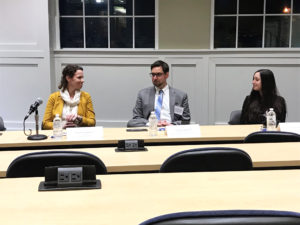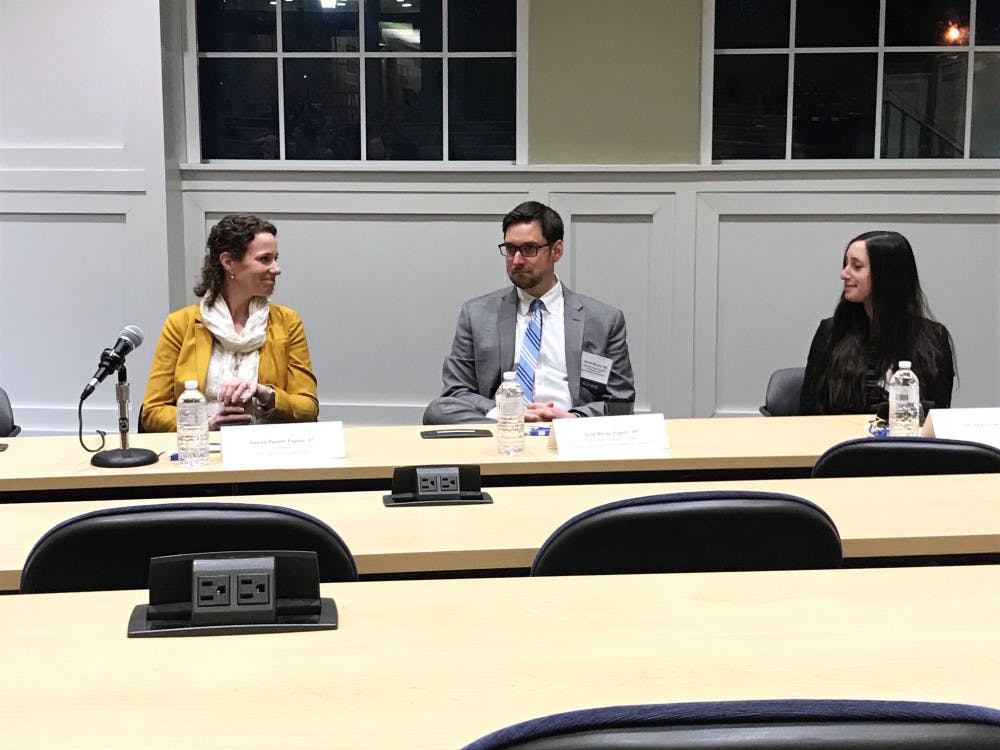By Michelle Lampariello
Former Editor-in-Chief

Students seeking careers in law were advised of key moves, educational opportunities and important skills to build by alumni who once stood in their shoes at the TCNJ Law Panel, hosted by the College’s Pre-Law Advisory Committee, the Pre-Law Society and the Career Center.
The event, which was moderated by senior English major Alexandra Yulich, was held in the Education Building Room 115 on Feb. 19 at 6 p.m.
The 10-person panel was comprised primarily of alumni, but Allen M. Silk, a shareholder at Stark & Stark, and Thomas Mahoney, vice president and general counsel at the College, also joined the discussion.
Panelists addressed questions from the audience about law school, advantages and disadvantages of various practice areas and how to make the most of an undergraduate career. The law school graduates also briefly explained their career history and how they landed their current jobs as lawyers and executives.
When asked if it is beneficial to take time off after graduating from the College before applying to law schools, the panelists generally agreed that it is a good idea to spend some time working beforehand in order to secure experience, find a passion and gain maturity.
When Scott Miccio (’08) graduated from the College during the recession, jobs for recent graduates were sparse. He worked for two years at the first job he could find, which happened to be at a pharmaceutical company, though he had no background in science.
“My plan at the time was to go to business school, so I took the ... business school entrance exam and did pretty well on that,” Miccio said. “Then, Rutgers-Camden sent me a letter that said, ‘Hey, we saw you did well on your business school entrance exam — we have this program here, you won’t have to take the LSATs, just come here and be a lawyer.’ Maybe it was kind of impulsive at the time, but I said ‘OK, yeah I’ll do that.’ I don’t regret it — I think it was a good decision.”
Though Miccio’s path into law school was one primarily unplanned, unlike many other lawyers who aspire to attend it for years, he credits the College’s journalism department for helping to prepare him by strengthening his writing skills. Miccio’s time at the College left such an impact on him that he even named his dog, Norsworthy, after the residence hall.
The panelists agree that law school causes students to restructure their thinking and approach situations in a different way than other professionals without the same education. Many alumni cited Introduction to Logic as the most helpful course at the College that prepared them for law school.
Lauren Ira (’04) double majored in English and what used to be women and gender studies at the College. She used to be a lobbyist, but she now pursues her passion for criminal justice by prosecuting violent crimes, including sexual assault, domestic violence and abduction cases.
“That became my specialty — trial after trial after trial, putting some pretty horrible people away that tie children up and keep them in cages,” she said. “My passion has always been for speaking up for those who don’t have a voice. Whether I found that in children, whether I found that in women’s rights or sexual assault crimes, my passion has always been speaking for people who maybe can’t have a voice, or they’re scared to have a voice.”
Several panelists expressed that a lawyer’s undergraduate major is hardly ever a factor in determining their success. They advised students to choose a major for which they have a passion because it will be easier to convey the persistence, diligence and trustworthiness law schools seek after selecting a major where students are happy to engage with faculty members and land internships and independent study offers.
Some students in the audience expressed concerns about working in the public sector and how that would impact them financially. The panelists advised students to do their research on financial aid and scholarship opportunities, but ultimately to pursue their passions. The theme of working toward a goal of happiness and fulfillment rather than money and power was central throughout the night as the panelists gave advice to students.
“Do what you’re passionate about — do what you love,” said Tony Tontore (’07). “Do that first, and worry about things like money and other things second.”







